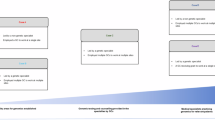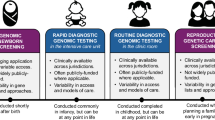Abstract
Driven by technological and scientific advances, the landscape of genetic medicine is rapidly changing, which complicates strategic planning and decision-making in this area. To address this uncertainty, we sought to understand genetic professionals’ opinions about the future of clinical genetic and genomic services in Canada. We used the Delphi method to survey Canadian genetic professionals about their perspectives on whether scenarios about changes in service delivery and the use of genomic testing would be broadly implemented in their jurisdiction by 2030. We conducted two survey rounds; the response rates were 32% (27/84) and 67% (18/27), respectively. The most likely scenario was the universal use of noninvasive prenatal screening. The least likely scenarios involved population-based genome-wide sequencing for unaffected individuals. Overall, the scenarios perceived as most likely were those that have existing evidence about their benefit and potential medical necessity, whereas scenarios were seen as unlikely if they involved emerging technologies. Participants expected that the need for genetic healthcare services would increase by 2030 owing to changes in clinical guidelines and increased use of genome-wide sequencing. This study highlights the uncertainty in the future of genetic and genomic service provision and contributes evidence that could be used to inform strategic planning in clinical genetics.
This is a preview of subscription content, access via your institution
Access options
Subscribe to this journal
Receive 12 print issues and online access
$259.00 per year
only $21.58 per issue
Buy this article
- Purchase on SpringerLink
- Instant access to full article PDF
Prices may be subject to local taxes which are calculated during checkout

Similar content being viewed by others
Data availability
All data generated through the study are reported in aggregate form within the manuscript. Respondent-level data will not be made available to protect the anonymity of respondents.
References
Greenberg SE, Boothe E, Delaney CL, Noss R, Cohen SA. Genetic counseling service delivery models in the United States: Assessment of changes in use from 2010 to 2017. J Genet Couns. 2020;29:1126–41.
Dragojlovic N, Borle K, Kopac N, Ellis U, Birch P, Adam S, et al. The composition and capacity of the clinical genetics workforce in high-income countries: a scoping review. Genet Med. 2020;22:1437–49.
Cancer Care Ontario. Recommendation Report for Ontario’s Clinical Genetic Services [Internet]. 2018. Available from: https://www.cancercareontario.ca/sites/ccocancercare/files/assets/ClinicalGeneticServicesRecommendationReport.pdf.
Concert Genetics. The current landscape of genetic testing [Internet]. 2018. Available from: https://www.concertgenetics.com/resources/2018-current-landscape-genetic-testing/.
Lionel AC, Costain G, Monfared N, Walker S, Reuter MS, Hosseini SM, et al. Improved diagnostic yield compared with targeted gene sequencing panels suggests a role for whole-genome sequencing as a first-tier genetic test. Genet Med. 2018;20:435–43.
Dragojlovic N, Kopac N, Borle K, Tandun R, Ellis SS, Birch P, et al. Utilization and uptake of clinical genetics services in high-income countries: a scoping review. Health Policy. 2021;125:877–87.
Adam S, Birch PH, Coe RR, Bansback N, Jones AL, Connolly MB, et al. Assessing an interactive online tool to support parents’ genomic testing decisions. J Genet Couns. 2019;28:10–7.
Zierhut HA, Macfarlane IM, Ahmed Z, Davies J. Genetic counselors’ experiences and interest in telegenetics and remote counseling. J Genet Couns. 2018;27:329–38.
Schmidlen T, Schwartz M, DiLoreto K, Kirchner HL, Sturm AC. Patient assessment of chatbots for the scalable delivery of genetic counseling. J Genet Couns. 2019;28:1166–77.
Birch S, Kephart G, Murphy GT, O’Brien-Pallas L, Alder R, MacKenzie A. Health human resources planning and the production of health: development of an extended analytical framework for needs-based health human resources planning. J Public Health Manag Pract. 2009;15:56–61.
Sorscher S. Universal multigene panel testing in all breast cancer patients. Am J Med. 2019;132:e765–6.
Beitsch PD, Whitworth PW. Can breast surgeons provide breast cancer genetic testing? An American Society of Breast Surgeons survey. Ann Surg Oncol. 2014;21:4104–8.
Brothers KB, Vassy JL, Green RC. Reconciling opportunistic and population screening in clinical genomics. Mayo Clin Proc. 2019 ;94:103–9.
Green ED, Gunter C, Biesecker LG, Di Francesco V, Easter CL, Feingold EA, et al. Strategic vision for improving human health at The Forefront of Genomics. Nature 2020;586:683–92.
Stevens B, Krstic N, Jones M, Murphy L, Hoskovec J. Finding middle ground in constructing a clinically useful expanded carrier screening panel. Obstet Gynecol. 2017;130:279–84.
Sullivan W, Payne K. The appropriate elicitation of expert opinion in economic models. Pharmacoeconomics 2011;29:455–9.
Nowack M, Endrikat J, Guenther E. Review of Delphi-based scenario studies: quality and design considerations. Technol Forecast Soc Change. 2011;78:1603–15.
Van Der Helm R. Towards a clarification of probability, possibility and plausibility: How semantics could help futures practice to improve. Foresight 2006;8:17–27.
Jorm AF. Using the Delphi expert consensus method in mental health research. Aust N Z J Psychiatry. 2015;49:887–97.
Hasson F, Keeney S, McKenna H. Research guidelines for the Delphi survey technique. J Adv Nurs. 2000;32:1008–15.
Skulmoski G, Hartman FT, Krahn J. The Delphi method for graduate research. J Inf Technol Educ. 2007;6:1–21.
Fink-Hafner D, Dagen T, Doušak M, Novak M, Hafner-Fink M. Delphi method: Strengths and weaknesses. Metod Zv. 2019;16:1–19.
Kohler JN, Turbitt E, Lewis KL, Wilfond BS, Jamal L, Peay HL, et al. Defining personal utility in genomics: a Delphi study. Clin Genet. 2017;92:290–7.
Scheuner MT, Russell MM, Chanfreau-Coffinier C, Peredo J, Yano EM, Hamilton AB, et al. Stakeholders’ views on the value of outcomes from clinical genetic and genomic interventions. Genet Med. 2019;21:1371–80.
Payne K, Nicholls SG, McAllister M, MacLeod R, Ellis I, Donnai D, et al. Outcome measures for clinical genetics services: a comparison of genetics healthcare professionals and patients’ views. Health Policy. 2007;84:112–22.
Harris PA, Taylor R, Thielke R, Payne J, Gonzalez N, Conde JG. Research electronic data capture (REDCap)–a metadata-driven methodology and workflow process for providing translational research informatics support. J Biomed Inf. 2009;42:377–81.
Dajani JS, Sincoff MZ, Talley WK. Stability and agreement criteria for the termination of Delphi studies. Technol Forecast Soc Change. 1979;13:83–90.
Linstone HA, Turoff M (eds). The Delphi method: Techniques and applications. Reading, MA: Addison-Wesley; 1975.
Trevelyan EG, Robinson N. Delphi methodology in health research: How to do it? Eur J Integr Med. 2015;7:423–8.
Diamond IR, Grant RC, Feldman BM, Pencharz PB, Ling SC, Moore AM, et al. Defining consensus: a systematic review recommends methodologic criteria for reporting of Delphi studies. J Clin Epidemiol. 2014;67:401–9.
Braun V, Clarke V. Using thematic analysis in psychology. Qual Res Psychol. 2006;3:77–101.
Clark MM, Hildreth A, Batalov S, Ding Y, Chowdhury S, Watkins K, et al. Diagnosis of genetic diseases in seriously ill children by rapid whole-genome sequencing and automated phenotyping and interpretation. Sci Transl Med. 2019;11:eaat6177.
Johansen Taber KA, Beauchamp KA, Lazarin GA, Muzzey D, Arjunan A, Goldberg JD. Clinical utility of expanded carrier screening: results-guided actionability and outcomes. Genet Med. 2019;21:1041–8.
Li C, Vandersluis S, Holubowich C, Ungar WJ, Goh ES, Boycott KM, et al. Cost-effectiveness of genome-wide sequencing for unexplained developmental disabilities and multiple congenital anomalies. Genet Med. 2021;23:451–60.
Waddell K, Wilson M. Rapid synthesis: examining the public provision and funding of clinical genetic tests. Hamilton, Canada (McMaster Health Forum, 2017).
Friedman JM, Cornel MC, Goldenberg AJ, Lister KJ, Sénécal K, Vears DF. Genomic newborn screening: public health policy considerations and recommendations. BMC Med Genomics. 2017;10:13–20.
Murray MF, Giovanni MA, Doyle DL, Harrison SM, Lyon E, Manickam K, et al. DNA-based screening and population health: a points to consider statement for programs and sponsoring organizations from the American College of Medical Genetics and Genomics (ACMG). Genet Med. 2021;23:989–95.
Nisselle A, Macciocca I, McKenzie F, Vuong H, Dunlop K, McClaren B, et al. Readiness of clinical genetic healthcare professionals to provide genomic medicine: an Australian census. J Genet Couns. 2019;28:367–77.
Costa T, Gillies B, Oh T, Scott J. The Canadian genetic counseling workforce: perspectives from employers and recent graduates. J Genet Couns. 2021;30:406–17.
National Society of Genetic Counselors. Professional Status Survey 2018: Demographics and methodology. 2018.
Canadian Medical Association. Medical Genetics Profile [Internet]. Available from: https://www.cma.ca/sites/default/files/2019-01/medical-genetics-e.pdf (2019).
National Society of Genetic Counselors. Professional Status Survey 2020: Canada. 2020.
Government of Nova Scotia. Nova Scotia Wait times [Internet]. Available from: https://waittimes.novascotia.ca/procedure/genetic-consultation#waittimes-90 (2021).
Patrinos D, Caron R, Maria B. Genetic counsellors, legal recognition, and the road less travelled. McGill J Law Heal ~ Rev droit Sté McGill. 2020;14:109–58.
Gorrie A, Gold J, Cameron C, Krause M, Kincaid H. Benefits and limitations of telegenetics: a literature review. J Genet Couns. 2021;30:924–37.
Ahimaz P, Giordano J, Disco M, Harrington E, Levinson E, Spiegel E, et al. COVID contingencies: early epicenter experiences of different genetics clinics at a New York City institution inform emergency adaptation strategies. J Genet Couns. 2021;30:938–48.
Mauer C, Zimmerman J, Lahiri S, Watson E, Parsi L, Berg J, et al. Adapting genetic counseling operations amidst the COVID-19 pandemic. J Genet Couns. 2021;30:949–55.
Shannon KM, Emmet MM, Rodgers LH, Wooters M, Seidel ML. Transition to telephone genetic counseling services during the COVID-19 pandemic. J Genet Couns. 2021;30:984–8.
Mills R, MacFarlane IM, Caleshu C, Ringler MA, Zierhut HA. Genetic counselor experiences with telehealth before and after COVID-19. J Genet Couns. 2021;30:999–1009.
Acknowledgements
The GenCOUNSEL Study is led by Alison M. Elliott, Jehannine Austin, Bartha Knoppers, and Larry D. Lynd with Project Manager Alivia Dey, and includes the following co-investigators: Shelin Adam, Nick Bansback, Patricia Birch, Lorne Clarke, Nick Dragojlovic, Jan Friedman, Debby Lambert, Daryl Pullman, Alice Virani, Wyeth Wasserman, and Ma’n Zawati.
Funding
GenCOUNSEL was funded through the Large Scale Applied Research Project (LSARP) Genome Canada competition with co-funding from Canadian Institute for Health Research (CIHR), Genome BC, Genome Quebec, Provincial Health Services Authority, BC Children’s Hospital Foundation, and BC Women’s Hospital Foundation.
Author information
Authors and Affiliations
Consortia
Corresponding author
Ethics declarations
Competing interests
The authors declare no competing interests.
Ethics declaration
This study was approved by the University British Columbia Research Ethics Board as a sub-study of the GenCOUNSEL research project (REB ID: H19-00427).
Additional information
Publisher’s note Springer Nature remains neutral with regard to jurisdictional claims in published maps and institutional affiliations.
Supplementary information
Rights and permissions
About this article
Cite this article
Borle, K., Kopac, N., Dragojlovic, N. et al. Where is genetic medicine headed? Exploring the perspectives of Canadian genetic professionals on future trends using the Delphi method. Eur J Hum Genet 30, 496–504 (2022). https://doi.org/10.1038/s41431-021-01017-2
Received:
Accepted:
Published:
Issue date:
DOI: https://doi.org/10.1038/s41431-021-01017-2
This article is cited by
-
Exploring individuals’ experiences with self-reported unmet need for genetic testing
European Journal of Human Genetics (2025)
-
Global trends and themes in genetic counseling research
European Journal of Human Genetics (2023)
-
Comment on Future trends in clinical genetic and genomic services by Borle et al.
European Journal of Human Genetics (2022)



